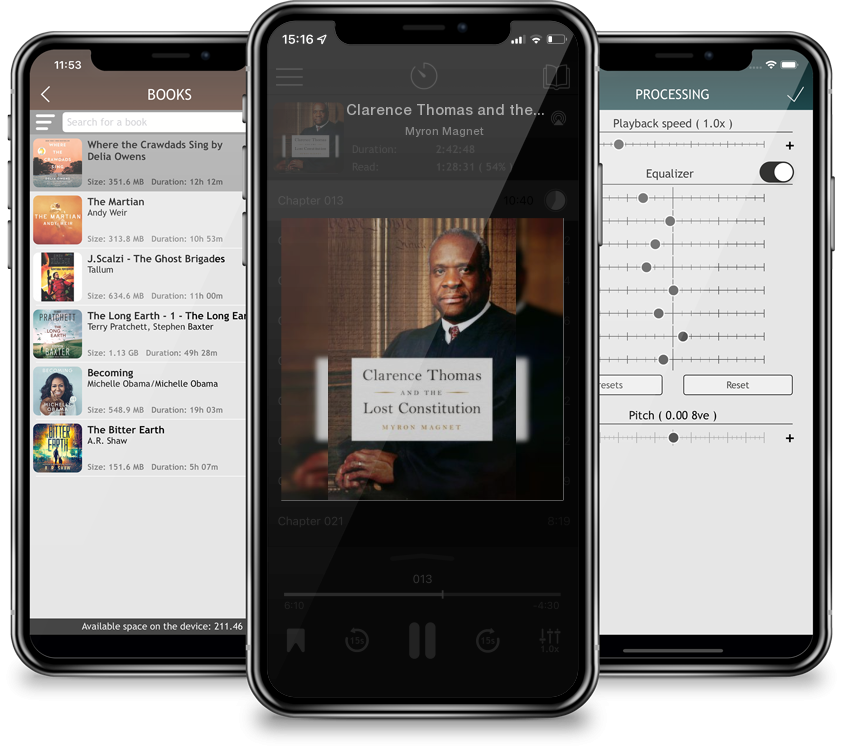Listen to Clarence Thomas and the Lost Constitution by Myron Magnet
Enjoy this audiobook with MP3 Audiobook Player - the ultimate iOS audiobook experience


When Clarence Thomas joined the Supreme Court in 1991, he found with dismay that it was interpreting a very different Constitution from the one the framers had written--the one that had established a federal government manned by the people's own elected representatives, charged with protecting citizens' inborn rights while leaving them free to work out their individual happiness themselves, in their families, communities, and states. He found that his predecessors on the Court were complicit in the first step of this transformation, when in the 1870s they defanged the Civil War amendments intended to give full citizenship to his fellow black Americans. In the next generation, Woodrow Wilson, dismissing the framers and their work as obsolete, set out to replace laws made by the people's representatives with rules made by highly educated, modern, supposedly nonpartisan "experts," an idea Franklin Roosevelt supersized in the New Deal agencies that he acknowledged had no constitutional warrant. Then, under Chief Justice Earl Warren in the 1950s and 1960s, the Nine set about realizing Wilson's dream of a Supreme Court sitting as a permanent constitutional convention, conjuring up laws out of smoke and mirrors and justifying them as expressions of the spirit of the age. But Thomas, who joined the Court after eight years running one of the myriad administrative agencies that the Great Society had piled on top of FDR's batch, had deep misgivings about the new governmental order. He shared the framers' vision of free, self-governing citizens forging their own fate. And from his own experience growing up in segregated Savannah, flirting with and rejecting black radicalism at college, and running an agency that supposedly advanced equality, he doubted that unelected experts and justices really did understand the moral arc of the universe better than the people themselves, or that the rules and rulings they issued made lives better rather than worse. So in the hundreds of opinions he has written in more than a quarter century on the Court--the most important of them explained in these pages in clear, non-lawyerly language--he has questioned the constitutional underpinnings of the new order and tried to restore the limited, self-governing original one, as more legitimate, more just, and more free than the one that grew up in its stead. The Court now seems set to move down the trail he blazed. A free, self-governing nation needs independent-minded, self-reliant citizens, and Thomas's biography, vividly recounted here, produced just the kind of character that the founders assumed would always mark Americans. America's future depends on the power of its culture and institutions to form ever more citizens of this stamp.
🚗 Transforming long drives into memorable journeys through the magic of audiobooks! 🚗📚 ListenBook Pro's noise reduction feature turns any environment into a cozy listening haven. An average audiobook experience. Nothing was wrong with it—the narration was fine, and the story was okay—but nothing particularly stood out. It served its purpose as entertainment during my commute.
📱 It's like having a personal audiobook library at my fingertips! This app's functionality is a dream come true for book lovers. 📚🔥 Noise reduction on ListenBook Pro is impressive. It's like getting a clear, immersive listening experience. The app's integration with CarPlay enhances my road trips with immersive audiobook journeys.
The seamless integration with my car's audio system is a road trip dream. This app has enriched my daily routine with the joy of stories and knowledge. ListenBook has turned my downtime into an opportunity for exploration and growth. This app is a lifesaver! I can now enjoy my favorite books on the go. 🎉 This app has turned my errands into exciting quests – I can conquer the grocery store while enjoying a book! 🛒📖
👩🍳 Cooking up a storm while enjoying thrilling stories – this app adds flavor to my meals! 🍳🎧 Finally, an app that caters to audiobook enthusiasts like me. The diverse format support and user-friendly design are a game-changer. 📱🔊 ListenBook's auto-rewind feature is a thoughtful addition that ensures I never miss a single word. This audiobook performed its function without excelling. The narrator's delivery was straightforward and easy to follow, though lacking in dramatic flair. The recording quality was decent with only occasional minor inconsistencies in volume. An acceptable but forgettable listening experience.
ListenBook's compatibility with various formats ensures that my audio needs are met. Gone are the days of waiting for the right time to read – this app is always ready. 🔥 Simplifying my reading routine – the app's functionality ensures I'm always one click away from literary adventures. 📚🔗 ListenBook’s playback speed control is very useful. I can listen at my own pace.
I love how this app turns even the dullest tasks into exciting storytelling moments. ListenBook's basic audio filters enhance my listening experience and make it uniquely mine. 🌟 Say goodbye to boredom during long drives – this app makes road trips fly by! 🚗🎉 High-quality playback even with complex formats like FLAC. Impressive! I've found my new favorite narrator! Their voice was perfectly suited to this material, with just the right blend of authority and approachability. The production quality was broadcast-level - no distracting breaths, clicks, or inconsistent volume. Already looking for more of their work.
Plays MP3, MP4, OPUS, OGG, FLAC, AWB, M4B, M4A, WMA, AAC formats
Optimized for iPhone, iPad, and iPod with seamless integration
Adjust playback speed from 0.5x to 3.0x for your listening preference
Import audiobooks via iTunes, cloud services, or direct downloads
Get your favorite audiobooks in supported formats from various sources
Import audiobooks to MP3 Audiobook Player using multiple methods
Control playback from your device, headphones, Apple Watch, or CarPlay
Join thousands of users who enjoy audiobooks with MP3 Audiobook Player daily
Download Now